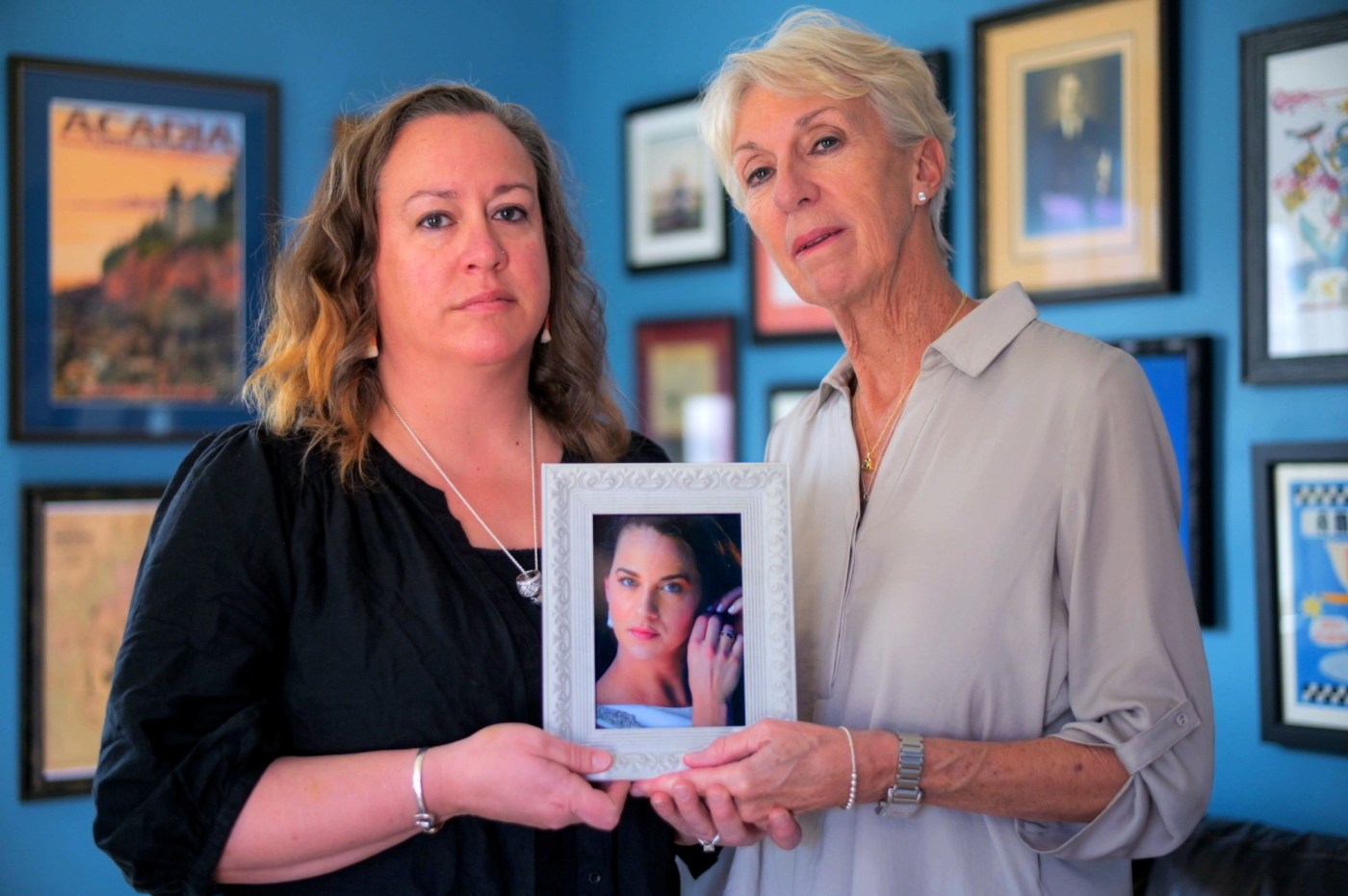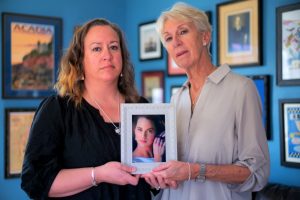
1 in 5 maternal deaths are from suicide. Why is it so hard to get help?
There are traces of Andrea Kolbe all over her big sister, Kyra Vocci.
A long chain with Kolbe’s wedding ring — an ornate silver band — hangs close to Vocci’s heart, beside a locket engraved with Kolbe’s photo and fingerprint. Tattooed on Vocci’s forearm is a rainbow and a quote Kolbe liked: “There is a rainbow of hope at the end of every storm.”
“We called each other soul sisters,” said Vocci, her eyes glossy with tears.
In December, one day after Kolbe turned 35 and four months after she gave birth to her first child, she took her own life at her Long Island, New York, home. When Vocci got the call, she dropped to the floor and screamed so loud and for so long that her neighbors called police.
Kyra Vocci has a tattoo on her forearm that reads, “There is a rainbow of hope at the end of every storm; Always, Andrea” with the closing in the handwriting of her late sister Andrea Kolbe, who took her own life in December while fighting postpartum depression. (Karl Merton Ferron/Staff)
Before Kolbe died, she had been struggling with postpartum depression, a mood disorder characterized by persistent feelings of sadness, worthlessness, guilt and shame. The condition can cause new mothers to experience terrifying and unwanted thoughts about accidentally or intentionally harming themselves or their baby.
Postpartum depression is distinct from the “baby blues” — a mild and temporary form of depression experienced by most new moms that typically goes away within two weeks after they give birth. The mood disorder is more serious, and, while it’s less common, studies estimate that up to 15% of people who have a baby will experience it. Black women and those with a history of depression or bipolar disorder are especially at risk.
According to national and local experts, screening and treatment for postpartum depression remains lacking across the country. Until recently, there was no standardized strategy for collecting data on maternal deaths from suicide. Now, research suggests that nearly 1 in 5 maternal deaths in the country are due to suicide, making such deaths more common than those caused by postpartum hemorrhage or hypertensive disorders.
Lately, Vocci, of Towson, and her mother — Lisa Kolbe, who lives in Gaithersburg — have been pouring their grief into advocacy. Earlier this month, they both testified in support of a bill in the General Assembly that would connect at-risk pregnant women and new moms to their local health departments. Both the House and Senate have passed versions of the bill.
Lisa Kolbe doesn’t mince words when asked how she is doing. She is broken. But Andrea — pronounced ahn-DREY-ah — would want her to be happy, so she is trying to move forward. And she doesn’t want to keep how her youngest daughter died private.
“I’m open about it with everyone,” she said. “It can’t be hush-hush anymore. It can’t. We’ve got to protect women. We’ve got to get them proper care.”
Infrequent screenings
Under guidelines from the American College of Obstetricians and Gynecologists released last year, providers should screen women for depression and anxiety multiple times during their pregnancy and after they give birth. However, according to data from public and private insurance companies, that usually doesn’t happen.
For Medicaid patients in 2022, screening rates were 16% during pregnancy and 17% postpartum, according to data compiled by the nonprofit National Committee for Quality Assurance. The rates were even lower for people covered by private insurance — 9% during pregnancy and 11% postpartum.
At Mercy Medical Center and Greater Baltimore Medical Center — the hospitals that deliver the most babies in Baltimore and Baltimore County, respectively — doctors said they regularly screen pregnant women and women after birth for mental health concerns.
Across the country, however, the maternity care infrastructure is threadbare, said Joy Burkhard, executive director for the Policy Center for Maternal Mental Health. More than a third of counties are maternity care deserts, meaning they have no hospitals or birth centers offering obstetric care and no obstetric providers, according to a 2022 report from the March of Dimes.
Providers who deliver babies also don’t learn enough about maternal mental health in medical school, which makes it hard for them to identify and manage the conditions and teach their patients about them, Burkhard said.
“It’s a bit like the Wild West in terms of what kind of care someone might or might not get,” she said.
Kyra Vocci wears a locket paying tribute to her deceased sister Andrea Kolbe. (Karl Merton Ferron/Staff)
Last year, the policy center released report cards measuring each state’s success at screening for and treating maternal mental health conditions. Maryland received a C-minus — above the national D grade.
According to the report card, the state is doing some things well. Last year, the Maryland Department of Health announced that people eligible for Medicaid would be able to access benefits for their entire pregnancy and the 12-month postpartum period, regardless of their immigration status or any changes in income or household size.
However, the report card also noted that Maryland doesn’t require providers to screen for maternal mental health disorders or require Medicaid to reimburse for that. A report released in 2016 by a task force created by the General Assembly said the state should start requiring screening. But that recommendation — like most others in the report — has yet to be fulfilled.
Barriers to treatment
Even when a woman is screened for depression, she may not be forthcoming if she’s worried her baby will be taken from her, or her doctor will think she’s a bad mom. Despite being so common and treatable, maternal mental health issues remain draped in societal misunderstandings.
“It’s a terrible stigma,” Vocci said. “Like, if you don’t feel blessed and joyful to have a baby, then something’s wrong with you.”
A banner proclaims, “Her Fight is My Fight, Postpartum Depression Awareness” outside the home of Kyra Vocci, to spread the message about postpartum depression. (Karl Merton Ferron/Staff)
Then, there’s what happens after screening: Research shows that less than a quarter of women who test positive for depression receive mental health treatment. Black women are even less likely to be screened and receive treatment than white women — even though they’re more likely to experience perinatal mood disorders, said Dr. Lindsay Standeven, clinical and education director of the Johns Hopkins Reproductive Mental Health Center.
There’s also a dire shortage of mental health workers, which has only gotten worse since the beginning of the coronavirus pandemic. Some providers are reluctant to screen women for postpartum depression because they know how hard it is to find help.
Related Articles
Doctors urge refrigerating acne creams to reduce cancer risk
Allergy season arrived early in US. Here’s how to keep pollen from ruining your spring
Newbury’s Pink House, a North Shore icon, slated to be removed: ‘Attractive nuisance’
New way for states to cover pricey gene therapies will start with sickle cell disease
Concerns grow over quality of care as investor groups buy not-for-profit nursing homes
Mercy doesn’t have a magic bullet for this problem, said Dr. Robert Atlas, the downtown Baltimore hospital’s chair of obstetrics and gynecology.
Many of the mothers who deliver at Mercy are from city neighborhoods where they grew up not getting enough to eat or being traumatized by other effects of poverty, Atlas said. That chronic stress can cause all kinds of complications in pregnancy, including preeclampsia, delivering babies preterm, and mood disorders like depression and anxiety.
Finding a therapist or psychiatrist also can be especially difficult for this population, since few mental health workers accept Medicaid — the plan that covers about 60% of Mercy’s patients, Atlas said.
But help doesn’t have to come from a therapist, Standeven said. She advocates for collaborative care models, where different kinds of providers work together to treat patients. An OB-GYN office, for example, may employ a social worker to help women navigate the mental health system.
“That kind of opens up the funnel that’s clogged right now for patients with more severe psychiatric illness to be seen in-person by experts in the area,” she said. “Right now, we don’t have offense or defense. We just are flooded.”
Making noise
Vocci’s home is usually filled with the clamor of three young boys, two cats and two dogs. But earlier this month, it was quiet as she stood in her kitchen in front of a shrine to her little sister.
Each day, Vocci lights a tall, milky white candle that sits before a framed photo of Kolbe. On the table, a vase is filled with seashells that look like tiny ballet slippers. Kolbe, a dance instructor, used to call them “slipper shells,” Vocci said. After her sister died, she collected them at New York’s Crescent Beach — one of Kolbe’s favorite places.
More than three months after Kolbe took her own life, Vocci and her mother are starting to accept that grieving the loss of her will be a lifelong journey. Sometimes, when Vocci is driving, her stomach will drop as she realizes again that her little sister is gone. Then, the tears come.
Kyra Vocci stands above her mother, Lisa Kolbe, posing with poster boards filled with a collage of photos of Andrea Kolbe, who took her own life in December while fighting postpartum depression. (Karl Merton Ferron/Staff)
Vocci has always been keyed into local politics. Kolbe wasn’t so much — she’d tell her big sister to calm down when she was on a soapbox. With Kolbe no longer around to tease her, Vocci’s interest in policy has morphed into a powerful source of purpose.
Vocci hopes to start a Maryland chapter of Postpartum Support International, a nonprofit that aims to increase awareness about the emotional changes that women experience during pregnancy and after birth. And she’s starting a charitable organization named after her sister — Andrea’s Wish Foundation.
The foundation is in its infancy, but Vocci hopes that one day it will raise enough money to help train health care providers to better treat maternal mental health conditions and help women afford therapy and find support groups.
Kolbe left a large hole in the Long Island dance community, Vocci said. She worked at a dance center there and taught and mentored hundreds of little girls over the years. But Vocci wants to ensure that her sister’s legacy will shine far beyond New York.
“I am here to make some noise,” she said.
If you are a loved one are experiencing distressing or suicidal thoughts, help is out there. Call or text 988, the country’s free suicide and crisis hotline. Pregnant and new moms can also dial or text 833-852-6262, the maternal health hotline run by the federal government.
A makeshift memorial in which Kyra Vocci lights a candle daily in remembrance of her sister Andrea Kolbe. (Karl Merton Ferron/Staff)


